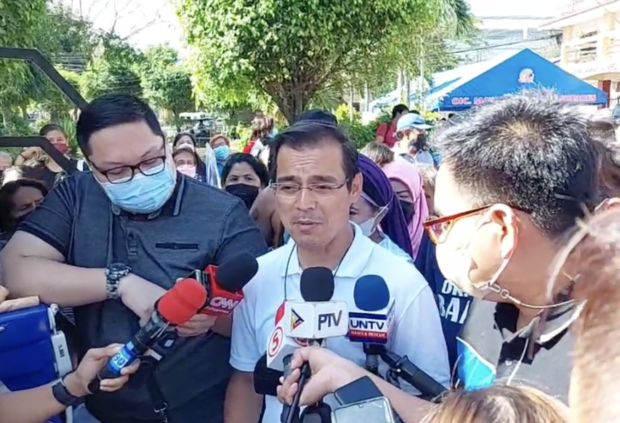
Manila Mayor Isko Moreno in GMA, Cavite. Screengrab from Facebook / Isko Moreno Domagoso
MANILA, Philippines — The country’s Information Technology and Business Process Management (IT-BPM) industry has found a strong ally in Aksyon Demokratiko standard bearer Isko Moreno Domagoso, who vowed to address the issues and challenges faced by the sector should he become the 17th President of the Republic.
Moreno made the assurance during a recent roundtable discussion organized by the IT and Business Process Association of the Philippines (IBPAP), the umbrella organization of the IT-BPM sector in the country, in recognition of the sector’s invaluable contribution to the economy.
“As an ally in creating jobs for more Filipinos and in nation-building, I assure you that my administration’s policies will be business friendly and consistent to induce foreign investors and enable sustained growth for the IT-BPM industry,” said Moreno.
The IT-BPM industry has generated an estimated $28.8 billion in revenues last year, with 1.43 million Filipinos directly working in the sector.
Industry leaders, led by IBPAP president and CEO Jack Madrid, said among the issues the sector wanted government to address include improving the ease of doing business, fostering future-ready digital talent and a stronger national digital infrastructure that will drive digitalization and help future-proof the IT-BPM sector.
Education, labor and employment, infrastructure, digital transformation and good governance are among the main pillars of Moreno’s 10-point Bilis Kilos Economic Agenda that will be his administration’s guiding principles to accelerate human and economic growth if elected president.
Moreno vowed that once elected, his administration would invest heavily on information technology infrastructure, particularly by building a national fiber optic backbone to boost the country’s communication capability, and connect all schools, government offices and industries that rely heavily on internet connectivity.
The 47-year-old presidential aspirant said having a national fiber backbone will connect our islands and provide stable and reliable interconnectivity that is crucial in accelerating human and economic growth, and enabling the Philippines to catch up with the modern world.
Moreno also plans to acquire satellite Internet access provided by Elon Musk’s Starlink. The internet satellite service that provides high-speed broadband internet is now being availed by 24 countries in the world.
He said having a national fiber backbone is also crucial in many aspects of government services, including the ease of doing business through the automation and digitalization of government processes.
Moreno said adopting a system of online transactions in government, like what he did in Manila, will also reduce human discretion which is the root of corruption.
“We have adopted online transaction in the city of Manila, and this is scalable. Customs and other income-generating agencies of government, we have to adopt existing technology. All we have to do is to put direction, right perspective, right mindset of a leader towards a better system for the people, and for us to collect properly so that we will not resort to raising taxes. Maging episyente na lang tayong kumolekta at maging masinop at mainam sa paggastos,” Moreno had said.
Due to his innovative reforms, programs and policies that successfully restored and increased business operations in the city, Manila was hailed by the Philippine Chamber of Commerce and Industry (PCCI) as the Most Business-Friendly local government unit for 2021.
Moreno’s accelerated infrastructure program also prioritizes building more power plants, both conventional and renewable, to ensure a stable and affordable supply of electricity to grow the economy and attract foreign investments, thus provide more jobs.
In education, the thrust of the Bilis Kilos agenda is to ensure that the Filipino youth are competent, capable and ready for the digital transformation of manufacturing, production and related industries and value creation processes, also known as Industry 4.0.
To do this, Moreno said he will increase the budget-to-GDP ratio of education from the present 3.17 percent to 4.3 percent, widen accessibility to quality education, and revise the curricula in all academic levels with focus on science, technology, engineering and mathematics (STEM) program.
“We will continue to invest on STEM (science, technology, engineering and mathematics) in all academic levels so that we will be competitive with highly-developed countries. We will go to that direction,” explained Moreno.
Moreno said government will invest to transform business process outsourcing (BPO) to knowledge process outsourcing which gives more income to about three times better pay. KPO is the process of outsourcing knowledge intensive activities that are data driven and encompass the process of gathering, managing, analyzing and delivering objective insights into businesses.
To further prepare for Industry 4.0, the Bilis Kilos agenda commits to increase government budget for research and development (R&D), from the current 0.16 percent of GDP to the global standard of 2 percent of GDP.
With the country’s IT-BPM industry facing serious threats from the widespread use of chatbots (or bots) and AI, and with 92 percent of new business value expected to be driven by AI in the next five years, R&D focus on artificial intelligence and additive manufacturing. The government’s R&D program will also be used to support the Philippine startup community, with the aim of creating a “unicorn” – a billion-dollar startup company in the likes of Singapore-based Grab and Lazada.
RELATED STORIES:
Isko Moreno eyes ‘next BGC’ as source of new revenues
Isko Moreno to invest more on science, technology, engineering, mathematics courses
Isko Moreno to push for fiber-optic system to boost communications

